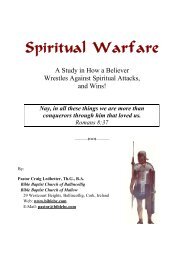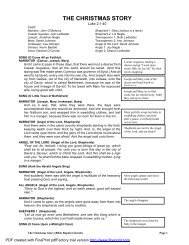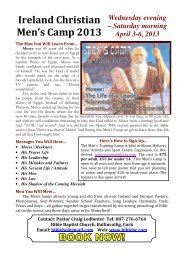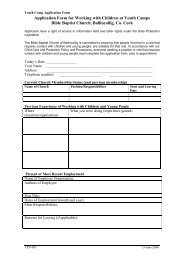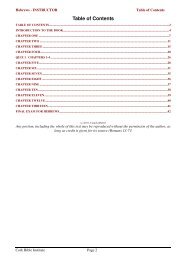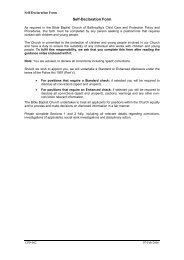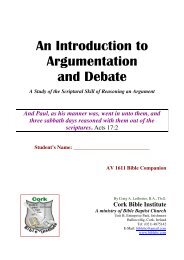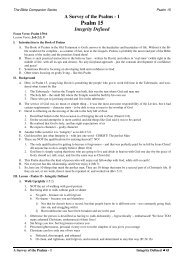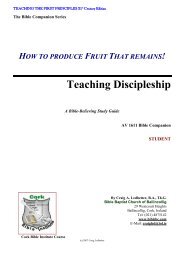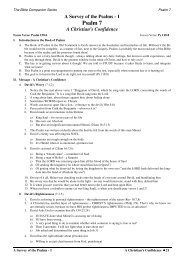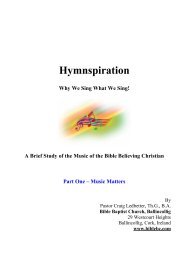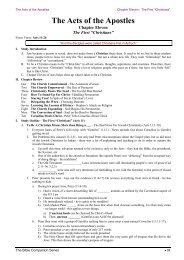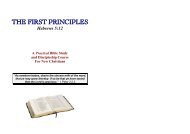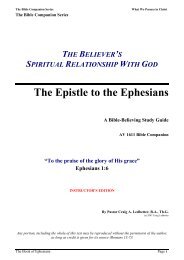Old Testament Survey - Student.pdf - Bible Baptist Church of Blarney
Old Testament Survey - Student.pdf - Bible Baptist Church of Blarney
Old Testament Survey - Student.pdf - Bible Baptist Church of Blarney
You also want an ePaper? Increase the reach of your titles
YUMPU automatically turns print PDFs into web optimized ePapers that Google loves.
<strong>Old</strong> <strong>Testament</strong> <strong>Survey</strong> – <strong>Student</strong> Edition<br />
Hosea, Joel, Amos, Obadiah, Jonah<br />
Amos<br />
Burdensome<br />
Author: Amos 1:1 identifies the author <strong>of</strong> the Book <strong>of</strong> Amos as the Prophet Amos.<br />
Date <strong>of</strong> Writing: The Book <strong>of</strong> Amos was likely written between 760 and 753 B.C. You will note that<br />
the books are not laid-out chronologically according to their date <strong>of</strong> writing.<br />
Purpose <strong>of</strong> Writing: Amos is a shepherd and a fruit picker from the Judean village <strong>of</strong> Tekoa when<br />
God calls him, even though he lacks an education or a priestly background. Amos' mission was<br />
directed to Israel. His messages <strong>of</strong> impending doom and captivity for the nation because <strong>of</strong> her sins<br />
were largely unpopular and unheeded, however, because not since the days <strong>of</strong> Solomon have times<br />
been so good in Israel. Amos' ministry takes place while Jeroboam II reigns over Israel, and Uzziah<br />
reigns over Judah.<br />
Key Verses: Amos 2:4; Amos 3:7; Amos 9:14.<br />
Brief Summary: Amos can see that beneath Israel's external prosperity and power, internally the<br />
nation is corrupt to the core. The sins for which Amos chastens the people are extensive: neglect <strong>of</strong><br />
God's Word, idolatry, pagan worship, greed, corrupted leadership and oppression <strong>of</strong> the poor. Amos<br />
begins by pronouncing a judgment upon all the surrounding nations, then upon his own nation <strong>of</strong><br />
Judah, and finally the harshest judgment is given to Israel. His visions form God reveal the same<br />
emphatic message: judgment is near. The book ends with God's promise to Amos <strong>of</strong> future restoration<br />
<strong>of</strong> the remnant.<br />
Practical Application: Sometimes we think we are not much to look at or listen to! We think we are<br />
just a salesman, farmer or housewife. Amos would be considered a nobody by most people. He wasn't<br />
a prophet or priest or the son <strong>of</strong> either. He was just a shepherd, a small businessman in Judah. Who<br />
would listen to him? But instead <strong>of</strong> making excuses, Amos obeyed and became God's powerful voice<br />
for change.<br />
God has uses nobodies such as shepherds, carpenters, fishermen all through the <strong>Bible</strong>. Whatever you<br />
are in this life, God can use you. Amos wasn't much. But he was a servant for God, and he impacted<br />
an entire nation for God!<br />
Brief Outline <strong>of</strong> Amos<br />
I. Pronouncing Judgment Against the Nations (1-2)<br />
A. Damascus (1:3-5)<br />
B. Gaza (1:6-8)<br />
C. Tyre (1:9-10)<br />
D. Edom (1:11-12)<br />
E. Ammon (1:13-15)<br />
F. Moab (2:1-3)<br />
G. Judah (2:4-5)<br />
H. Israel (2:6-16)<br />
II. Specific Judgments Against Israel (3-6)<br />
A. Judgment Visions (7-9)<br />
B. Locusts (7:1-3)<br />
C. Fire (7:4-6)<br />
D. Plumb line (7:7-9)<br />
E. Summer fruit (8:1-3)<br />
III. Amos and Amaziah (7:10-17)<br />
A. Capitals (9:1-4)<br />
B. Salvation <strong>of</strong> the Davidic Dynasty in Judah (9:11-15)<br />
CBI - Practical Doctrine Page 94



